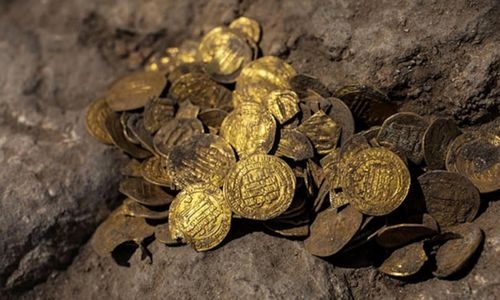UK couple find £250,000 of gold coins under kitchen floor
Agencies | London
The Daily Tribune – www.newsofbahrain.com
A lucky couple who discovered a treasure trove of 264 gold coins hidden beneath their kitchen floor is planning to sell it for £250,000. While metal detectorists often spend years searching for such a rich trove, the unidentified couple were flooring their kitchen floor when they discovered a cup full to the brim with coins dating back up to 400 years.
The astonishing discovery was uncovered just six inches beneath the concrete at an 18th Century detached residence in Ellerby, North Yorks. The owners, who have lived in the house for over ten years, were originally taken aback when they discovered their treasure. When they pulled it from the floor, they discovered a cache of coins in a salt-glazed ceramic cup about the size of a Coke can.
They discovered the gold coins, which dated from 1610 to 1727 and covered the periods of James I, Charles I, and George I.The couple contacted London auctioneers Spink & Son and an expert visited their property to evaluate the hoard. The coins were traced back to the Fernley-Maisters, a wealthy and powerful commercial family from Hull.
In the early 1700s, the Maister family was an importer and exporter of iron ore, lumber, and coal, and later generations served as Whig politicians and Members of Parliament. The coins were collected by Joseph Fernley and his wife Sarah Maister during their lifetime. Fernley died in 1725, and his widow remained in Ellerby until she died in 1745, at the age of 80.The coins were discovered in July 2019, and they have now been properly disclaimed and can be auctioned.
They have a combined total estimate of £250,000. A highlight of the auction is a 1720 George I guinea with a mint mistake. The coin, which lacks a king's head and instead has two 'tail' sides, is likely to earn £4,000 at auction. A Charles II guinea from 1675 features a spelling error, with the king's Latin name, misspelt as CRAOLVS rather than CAROLVS, and is estimated to be worth £1,500. "This is a fantastic and extremely important discovery," remarked auctioneer Gregory Edmund.
It is extremely rare for hoards of English gold coins to ever appear on the market."This find of almost 260 coins is also one of the largest on archaeological record from Britain, and it was purely accidental: the owners were rebuilding the floor of their house when they discovered a container the size of a Diet Coke can full of gold.
"The coins range in date from 1610 to 1727, which is quite long for a trove. It also begs the question of why someone opted to bury a large number of coins at the beginning of the 18th century when there were banks and bank notes - all of which meant hoarding should not have occurred.
Related Posts

